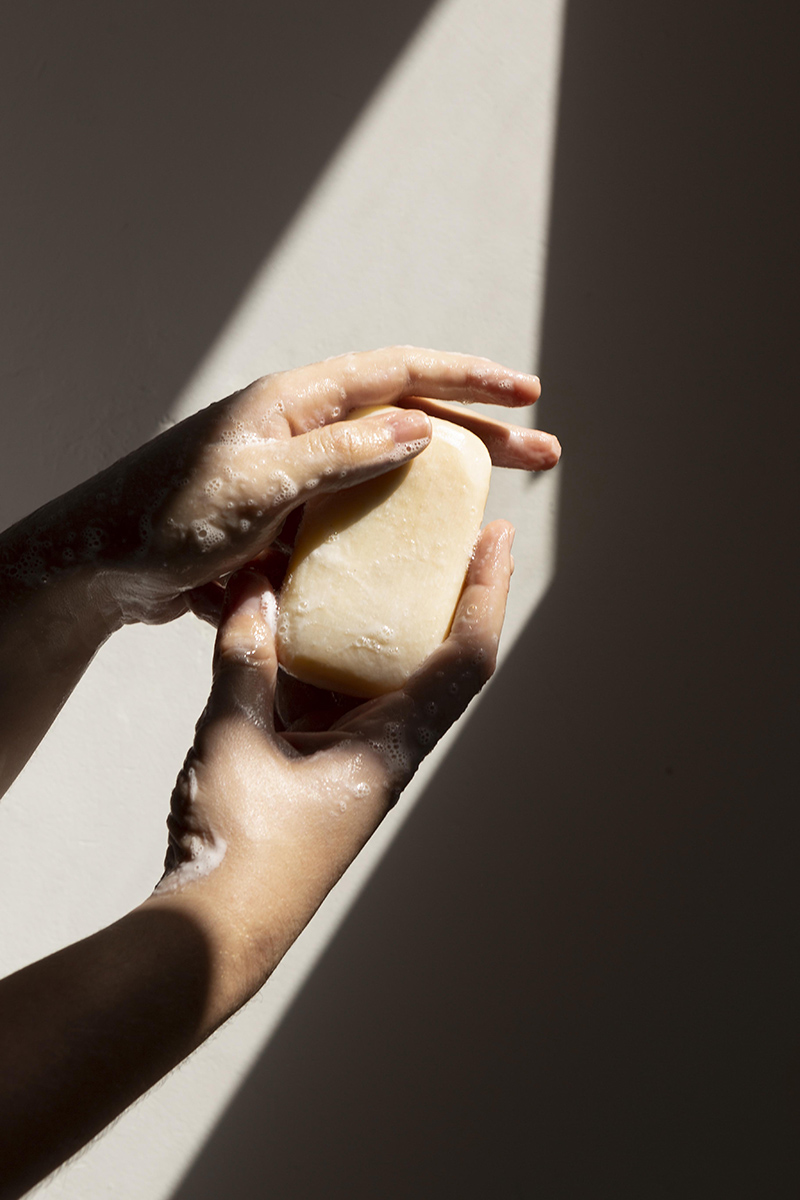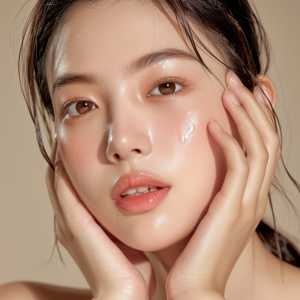New members will get 100 yuan shopping credit immediately when they join. Free shipping when spending over $800 in the whole store.
"Why Shouldn't You Wash Your Face While Bathing? A Comprehensive Analysis of the Importance of Face Washing and Bathing"
在我們日常生活中,洗澡和洗臉是常見的保養步驟。各位職業媽媽可能會驚訝地發現,洗澡時最好不要同時做洗臉的動作,原因是什麼呢?就跟著小編全面了解洗澡和洗臉的重要性,並解釋為什麼洗澡不應該同時洗臉的原因。
A deep understanding of the relationship between face washing and bathing is crucial for those interested in skincare. Let's consider this introduction as the beginning of our exploration into this topic, with each section providing a brief summary. Now, let's delve into why washing your face while bathing is not recommended.
You can refer to How to Wash Your Face Without Getting Pimples
Why You Shouldn't Wash Your Face While Bathing?
"Washing the face is a crucial step in our daily skincare routine, but many people tend to wash their faces while bathing. However, what you may not know is that washing your face directly while bathing can have some negative effects on the skin. Let's delve into why it's not recommended to wash your face while bathing."
Firstly, the water temperature during a bath is typically higher than the ideal temperature for face washing. Hot water can dissolve the skin's natural oils, leading to dryness and sensitivity. In contrast, when washing the face, we typically use lukewarm water, which is gentler on the skin and doesn't disrupt the natural protective barrier.
Secondly, the bath products used often contain higher levels of cleansing ingredients, such as shampoos and body washes. These products are designed to remove dirt from hair and the body and may have stronger degreasing agents, which could be too harsh for face washing. Washing the face directly with these cleansing products during a bath might upset the balance of the skin and lead to over-cleansing and dryness.
此外,洗臉時我們可以根據肌膚類型選擇適合的潔面產品。每個人的膚質都不盡相同,因此需要使用特定的潔面產品來滿足自己的需求。在洗澡時洗臉,我們很難有充足的時間和條件來選擇適合自己的潔面產品,這可能會影響我們對肌膚的有效清潔和保養。
洗澡時直接洗臉可能會對肌膚造成不必要的傷害。爲了保持肌膚的健康和美麗,建議在洗澡時不要同時洗臉,而是在洗澡後使用適合自己膚質的洗臉產品進行徹底清潔。記住,正確的洗臉步驟和選擇適合自己肌膚的產品是擁有健康肌膚的關鍵。
Key Factors Influencing Face Washing After Bathing
In the discussion of washing the face after bathing, several key factors are worth noting. Here is a detailed explanation of these factors:
- Temperature - During a bath, we typically use warm water. However, warm water can make our skin more fragile, washing away the natural protective oils on the skin's surface. Washing the face immediately after bathing can further damage the skin barrier, leading to dryness and sensitivity.
- Bath Products - During a bath, we often use products containing foaming agents and cleansers. The chemical components of these products may cause dryness, sensitivity, or other discomfort, especially on the delicate skin of the face. Therefore, it is encouraged to use facial cleansers specifically designed for cleansing facial skin, which are milder and place less burden on the skin.
- Duration of Bathing - The time spent bathing is often longer than the time spent washing the face. This means that the facial skin is exposed to water for a more extended period. Prolonged soaking can result in more significant loss of moisture from the facial skin, making it drier. It is advisable to avoid extended direct immersion of the face in water during bathing.
因此,在洗澡後請為您的臉部肌膚做保養。洗澡後不要立即洗臉,而是等待一段時間,讓肌膚恢復到正常狀態。選擇溫和的洗面乳,避免使用含有刺激性成分的洗臉產品。同時,確保只在臉部輕輕按摩,避免過度摩擦和用力擦拭。這樣做將有助於維持健康與年輕的肌膚狀態。

Potential Issues with Washing Your Face During Bathing
While washing your face during a bath is a common practice, did you know that this habit could have some adverse effects on your skin? During a bath, the water temperature is often higher, causing the skin's surface temperature to rise and stimulating increased sebum secretion.
When you wash your face during a bath, the steam from the hot water can soften the skin's stratum corneum, leading to enlarged pores. At this point, if you use a facial cleanser to clean your face, it may enter the enlarged pores, and the action of washing may cause the cleanser to remain in the pores, leading to clogged pores. This, in turn, can result in issues such as pimples and blackheads.
Additionally, the skin tends to lose moisture during bathing, leading to excessive dryness. Washing your face during a bath may remove oils from the skin all at once, disrupting the skin's natural protective barrier and making it more prone to dryness and sensitivity.
Moreover, in the pursuit of cleanliness, some people may vigorously rub their faces during a bath. This kind of action can be abrasive to the skin, potentially causing skin sensitivity over time.
Therefore, to protect the health of your skin, we recommend not washing your face during a bath. If you really need to clean your face during a bath, you can use a mild facial cleanser, gently massage the skin, and then rinse with lukewarm water. After washing your face, remember to immediately use moisturizing products to replenish moisture to your skin and help restore the skin's natural protective barrier.
Maintaining good face washing habits is crucial for the health of the skin. Remember to use a dedicated facial cleanser at the right time to clean your face, avoid washing your face during a bath, and protect your skin from unnecessary damage."

"Behaviors to Avoid When Bathing and Washing Your Face for Working Moms
After a bath, you may wish to wash your face immediately to remove residues and dirt from your skin. However, this behavior can be risky for your skin. Here are the behaviors to avoid when washing your face after a bath:
1.Using Overly Hot Water
During a bath, the water temperature is typically higher, which may cause your skin to overheat and become dry. When you wash your face with hot water, it strips away the skin's natural moisturizing factors, making the skin more susceptible to moisture loss. Overly hot water can also potentially stimulate the skin, leading to sensitivity.
2.Using Excessive Facial Cleanser
While bathing, people often use a considerable amount of facial cleanser to clean their faces. However, using too much facial cleanser can result in dryness and irritation of the skin. The cleansing ingredients in the facial cleanser may wash away the natural oils on the skin, disrupting the skin's natural barrier function and making the skin more susceptible to external irritants.
3.Using Oily Skincare Products
After a bath, many people use oily skincare products to moisturize and nourish the skin. However, using oily products may leave a heavy layer of oil on your face, blocking pores and causing the formation of pimples and acne. Additionally, oily skincare products may trigger sensitivity reactions in some individuals.
4.Ignoring Residues from Body Cleansing Products
When using body cleansing products such as shampoo or body wash during a bath, residues of these products may remain on your face. The ingredients in these cleansing products may cause irritation and discomfort to the facial skin. Therefore, after a bath, it's crucial to ensure that residues are thoroughly rinsed off with lukewarm water, leaving the facial skin in an environment free of residues.
Over-Rubbing and Friction on the Face
Some people may excessively rub and friction their faces during a bath, hoping to thoroughly clean their skin. However, this can cause irritation and damage to the skin's surface. Since hot water and friction can make the skin more prone to damage, it is recommended to gently pat the face with a soft towel after bathing to avoid additional stimulation.
In summary, it's advisable to avoid washing your face immediately after bathing, as it may lead to dryness, sensitivity, and other issues. Instead, wait until your skin has cooled slightly after bathing before engaging in proper facial cleansing to ensure the health and beauty of your skin. Remember, maintaining the correct facial cleansing habits is crucial for overall skin health and appearance.
Reference: Why You Shouldn't Wash Your Face While Bathing
Why You Shouldn't Wash Your Face While Bathing - Conclusion
In this article, we've delved into the importance of not washing your face while bathing. Bathing and face washing are two related but different skincare steps. While some may find it convenient to wash their faces during a bath, such a habit can potentially cause problems for the skin.
Firstly, the temperature of bathwater is generally higher, leading to the loss of moisture from the skin. Washing the face with hot water during a bath may strip away natural oils, leaving the skin dry and tight. Additionally, the soaps and shampoos used during a bath often contain ingredients that may irritate facial skin.

Secondly, during a bath, our pores expand due to the action of hot water. This can cause the pores on the face to also enlarge, making it easier for dirt to be absorbed. Washing the face at this time may result in the easier entry of dirt into the pores, increasing the likelihood of pimples or blackheads.
Furthermore, the bathing process is typically faster than face washing, and people may hastily wash their faces during a bath, unable to perform thorough cleaning and massage. Proper facial cleansing requires a gentle massage and the use of a suitable facial cleanser. Neglecting these steps may reduce the effectiveness of face washing, leaving the skin inadequately cleaned and conditioned.
In conclusion, it's best to avoid washing your face while bathing. To maintain the health and beauty of your skin, dedicate specific time and space for face washing. It is recommended to wait until your skin has cooled after a bath and then use a mild facial cleanser and massage techniques to ensure thorough cleanliness and care. Maintaining good face washing habits will help preserve firm, bright, and healthy skin.
We hope this article inspires better skincare habits and assists you in taking better care of your skin health!
FAQ on Why You Shouldn't Wash Your Face While Bathing
Question: Why should you not wash your face while bathing?
Answer: When we bathe, hot water causes the pores of the skin to expand, and using facial cleansers during this time may be too harsh on the skin. Additionally, the steam from hot water can take away moisture and natural oils from the skin, leading to dryness.
Question: How should you wash your face after bathing?
Answer: After bathing, it's recommended to wait for some time to allow the skin to return to its normal pH and moisture levels. Then, use a gentle facial cleanser, cleanse your face appropriately, and rinse thoroughly with lukewarm water. Finally, remember to immediately use a moisturizer or hydrating product to lock in moisture and keep the skin supple.
Question: What issues may arise from washing your face during bathing?
Answer: Washing your face during a bath may lead to various skin problems. Firstly, the high temperature of the water and cleansing products may compromise the skin's natural protective barrier, making it more susceptible to irritation and infection. Secondly, hot water can cause over-secretion of sebum, resulting in oily and clogged skin. Lastly, excessive rubbing during bathing may lead to skin damage."
BioSkin hopes to bring everyone a worry-free, pure, and sustainable skin conditioning system instead of blindly pursuing immediate results and bearing the long-term costs, so that everyone can gain beauty and tranquility from it. Everyone can enjoy pure beauty while pursuing perfection and worrying about it.

Get back your original Beauty in and out
If you want to receive health care content related to ISG Wellness&Beauty products on a regular basis, please join th ISG Wellness&Beauty official Linewhere professional nutritionists and beauticians will answer your questions and help you understand the products better.
If you want to receive health care content related to ISG Wellness&Beauty products on a regular basis, please join the ISG Wellness&Beauty Line communityto learn more.



